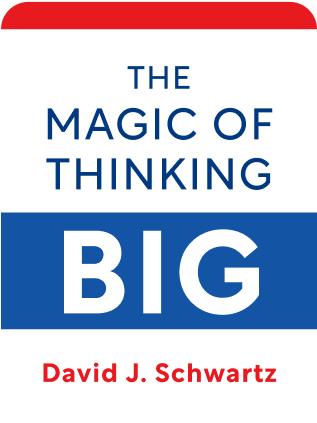

This article is an excerpt from the Shortform book guide to "The Magic of Thinking Big" by David J. Schwartz. Shortform has the world's best summaries and analyses of books you should be reading.
Like this article? Sign up for a free trial here .
What do you do when you encounter setbacks in life? Do you lose hope and give up? Or do you persevere until the end?
Everyone meets with opposition and setbacks in life. Unsuccessful people allow these setbacks to defeat them. They use opposition as an excuse to throw in the towel and say it just can’t be done, whether it’s buying a house, starting a business, or getting a promotion.
Don’t let these setbacks paralyze you—use them to move forward. Here’s how.
Don’t Let Setbacks Set You Back
There are three keys to handling setbacks in life constructively:
- Salvage something from every failure.
- Don’t blame others or bad luck for a setback. Don’t beat yourself up, either.
- Boldly experiment with new approaches to overcome setbacks.
1) Salvage Something From Every “Failure”
Everyone encounters setbacks in life. Major setbacks can be devastating. Our first impulse is often to quit or react with anger. But reacting emotionally robs us of a chance to learn from that setback.
Successful people pull a small victory out of every defeat. They find the lesson and apply it, learning what went wrong.
- After a plane crash, the FAA examines the data to figure out what went wrong so it never has to happen again. This is a small victory pulled from a tragic setback.
- A student fails a course. She could be angry at the professor and feel outraged at the injustice. Or, she could figure out where she went wrong. Maybe she didn’t work hard enough or study properly. Maybe she should have asked for extra help. If she applies these lessons to the next course, she’ll be more likely to succeed.
“A failure is a man who has blundered, but is not able to cash in on the experience.” – Elbert Hubbard
Similarly, don’t see a setback as a permanent condition that destroys a path for you forever. Learn from it, get better, then try again.
- Imagine you’re driving in a car and hit a dead end. You wouldn’t give up and set up camp there; you’d find an alternative route, even if you have to backtrack.
- If an airport is closed due to weather, a plane wouldn’t circle aimlessly – it would reroute to another airport.
Successful people take detours in stride. They keep going, even if they have to find a new path toward their goals. They know that you don’t need to change your goal when you hit a detour; you just need to find a different route.
2) Don’t Assign Blame for Your Setbacks
When we win, we want to take credit. But when something goes sideways, we tend to look for someone or something else to blame.
We often blame others for our failures.
- A salesperson blames customers when he loses contracts.
- Spouses blame each other when finances go awry.
- Executives blame employees when the company misses goals.
Others may get in our way at times, but blaming others for setbacks is unproductive. Instead, successful people look inward and become self-critical in a constructive way. Find your weaknesses objectively, then correct them.
But don’t take it too far. Don’t say, “I’m really a failure.” Say, “Now that I learned this, I’m going to become a bigger winner.”
People also like blaming bad luck for failing. Blaming bad luck sucks all your personal responsibility out of the setback. You learn nothing by blaming bad luck, because there’s nothing you can do better next time.
- Imagine if a plane crashed, and the FAA shrugged and said, “Sorry, it just happens.” Nothing would be learned and future tragedies wouldn’t be averted.
- Successful people don’t blame bad luck for setbacks. Blaming luck robs them of the opportunity to grow stronger. They glean the lesson from a setback, focus on things about themselves they can change, and move forward.
3) Experiment with New Approaches to Overcome Setbacks
Persistence is important in becoming successful. You have to keep trying, learning and growing. But when you’re trying to become a person who bounces back stronger and better after a setback, persistence isn’t enough. You need to experiment with your approach, trying new things to get better success the next time.
- A writer is determined to be a published author. He’s persistent, having written 100 books, but nothing’s ever been published. There might be something wrong with his method. He shouldn’t write his 101st book the exact same way. He should experiment with new formats, writing styles, subjects, and marketing.
- Thomas Edison conducted thousands of experiments when inventing the light bulb. Most experiments failed, but each tried something new and inched closer to his goal.
There are three ways to develop a greater willingness to experiment:
- Believe there is a way. When facing an obstacle, instead of thinking, “Well, that’s the end,” think, “There is a way to solve this problem.” When you believe there’s a way, positive thoughts release creative thinking and quell negative energy.
- Many small businesses fail in the first few years. They may say “there was no way we could succeed – the competition/the economy/the customers gave us no options.”
- Businesses that thrive encounter the same issues, but believe there is a way through — and find the way.
- Take a break. We are often so engrossed in solving a problem we can’t see new approaches. When you hit a roadblock, take a break. When you’re mentally refreshed, you can approach the problem with fresh eyes.
- See the good in a situation. When bad things happen, look for the positives. When you lose a job, think of it as an opportunity to find a job you like better that pays more. You can find the good in any situation if you look for it.

———End of Preview———
Like what you just read? Read the rest of the world's best book summary and analysis of David J. Schwartz's "The Magic of Thinking Big" at Shortform .
Here's what you'll find in our full The Magic of Thinking Big summary :
- The strategies and techniques that successful people use
- How to find victory in every setback
- How to think creatively and come up with innovative solutions






